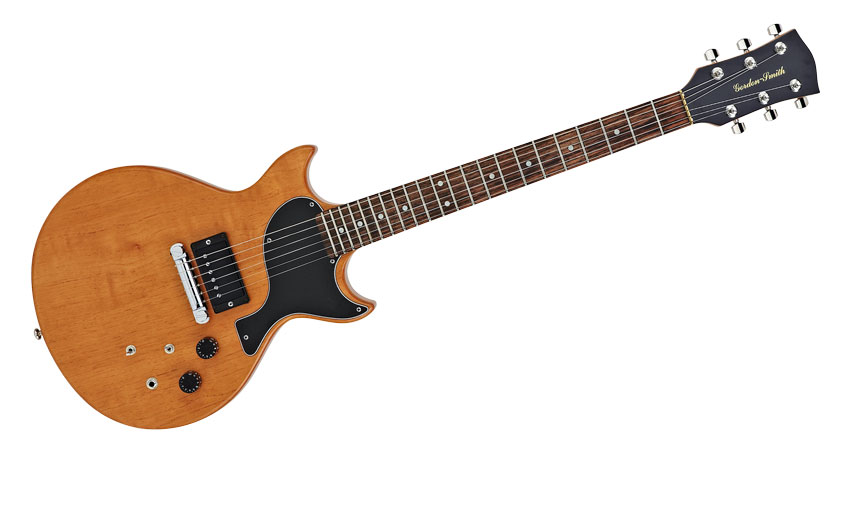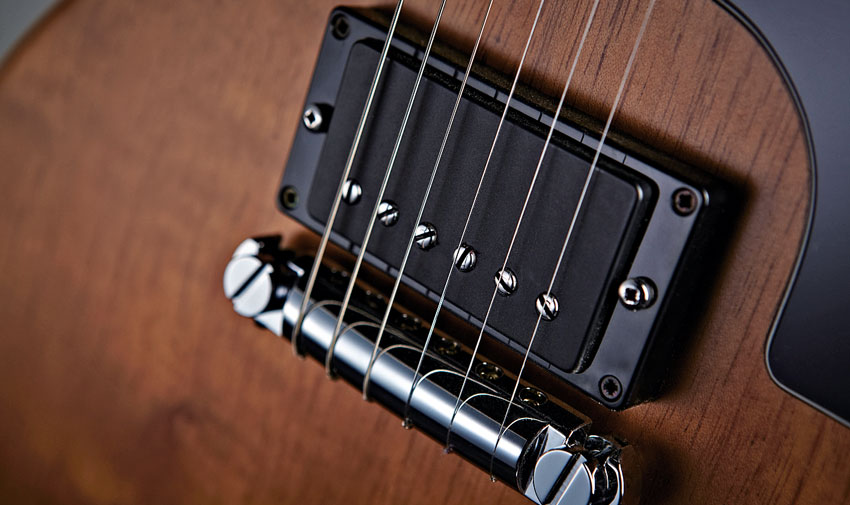MusicRadar Verdict
Surprisingly versatile, more 'rock' take on the single-pickup Junior, with options.
Pros
- +
Excellent value for money. Customisation options. Good tones for punk and spikier rock tasks.
Cons
- -
Build quality is decent - but not exactly bomb-proof.
MusicRadar's got your back

Gordon-Smith GS-1

Pickup
The first thing that strikes you when perusing the GS-1 spec sheet is that - unlike virtually any guitar we can think of at this lowly price, and certainly recently reviewed rivals like the Fender Esquire and Eastwood Airline '59 LP - Manchester-based Gordon Smith offers numerous no-cost and up-charge options. These really are custom, UK-made guitars for those on a budget.
Build
The start-up GS-1 has a cedar body with a thin, SG-like depth of approx 35mm, which contributes to a lightweight feel. The glued-in neck is Gibson-like; the actual scale length is the correct dimension used by Gibson, slightly shorter than the (mis)quoted 628mm.
The neck has a fairly wide nut width and slim depth in its lower positions, but broadens out by the 12th fret to 23.8mm. Shape-wise, all GSG necks seem to have their own character; this one seems slightly asymmetrical in the hand - a slightly steeper shoulder on the bass side, but in combination with the low-rise wide frets and slinky setup, it almost plays itself.
"Gordon-Smith has its own way with pretty much everything and this GS-1 is no different"
We'd definitely go up a gauge or two if we were using this in anger. This instrument is actually a bit of an experiment for GSG: the fingerboard is 'charred' ash, though we thought it looked like a light-coloured rosewood, the standard wood used by GSG.
Typically, we have a height-adjustable brass nut, smooth Van Gent tuners, a one-piece wrapover bridge, a GSG ceramic humbucker with volume (plus coil-split) and tone that, along with the output jack, are all face-mounted.
The two additional switches engage the optional Volumax volume booster and Blacklab overdrive simulator, which we covered in our Gordon-Smith Ghost Rider review. For this test we'll ignore them, and instead we'll concentrate on the base-price instrument.
Sounds
Gordon-Smith has its own way with pretty much everything and this GS-1 is no different. At the top of the tone control is a small notch that effectively bypasses it. We suggest you knock the tone control back a little, as otherwise this is quite a piercing-sounding guitar.
Want all the hottest music and gear news, reviews, deals, features and more, direct to your inbox? Sign up here.
There's plenty of clout, but it's a little saturated and with a slightly papery/razor-y high-end. It also edges into feedback quite easily and thanks to the light weight, has a resonant 'seat-of-your-pants' kinda feel.
The coil-split reminds us of the aforementioned Fender Esquire's tone, but with a little more dirt: less metallic, more woody and percussive. Although not set up for slide, this writer used one for years as a slide guitar par excellence.
The GS-1 gets close to the Les Paul Junior's flame, but does so with a more primitive, punky resonance along with some 'hidden' textures, so long as you engage the coil-split and really use the tone and volume.
Check out this Gordon-Smith (and its host of options) if you want to experience a Junior-like ride. More experienced players, in particular, might enjoy the sonically versatile GS-1.
Dave Burrluck is one of the world’s most experienced guitar journalists, who started writing back in the '80s for International Musician and Recording World, co-founded The Guitar Magazine and has been the Gear Reviews Editor of Guitarist magazine for the past two decades. Along the way, Dave has been the sole author of The PRS Guitar Book and The Player's Guide to Guitar Maintenance as well as contributing to numerous other books on the electric guitar. Dave is an active gigging and recording musician and still finds time to make, repair and mod guitars, not least for Guitarist’s The Mod Squad.
